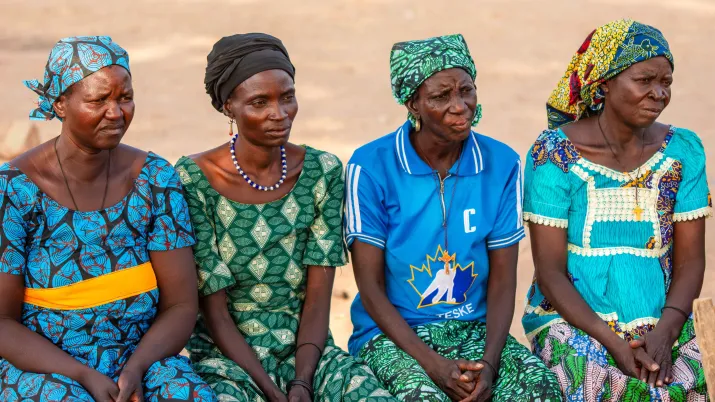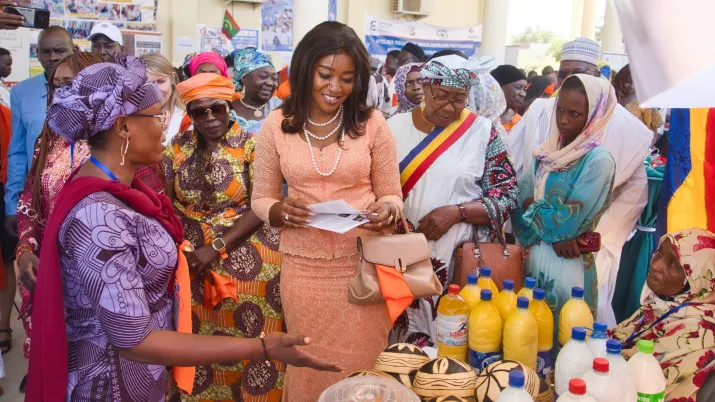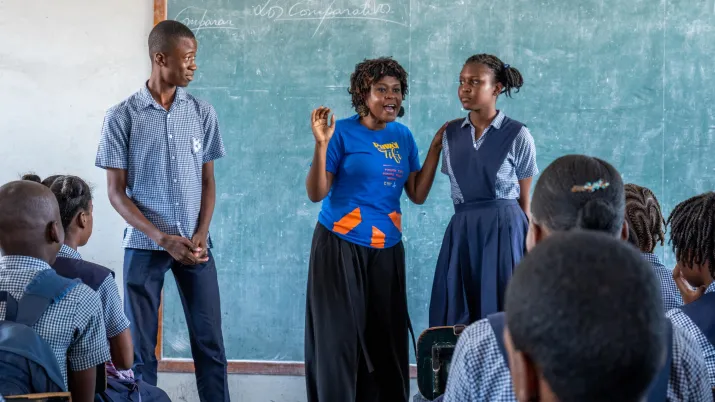Partager la page
Égalité de genre - Une approche systémique et holistique pour une transformation durable
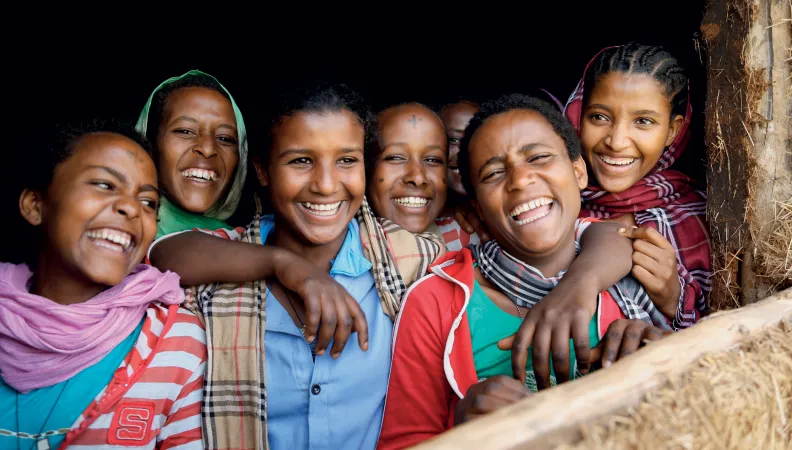
Les inégalités de genre demeurent un défi central et urgent du développement durable, et sont sans cesse amplifiées par des crises multiples : politiques, économiques, sanitaires, climatiques et sociales. Les femmes et les filles sont davantage exposées aux violences, tout en restant sous-représentées dans les sphères de décision, alors même qu’elles jouent un rôle essentiel dans l’émergence de sociétés plus justes, inclusives, durables et pacifiques.
C’est pourquoi nous nous engageons fermement à promouvoir l’égalité de genre, en alignant nos actions sur la stratégie internationale de la France pour une diplomatie féministe, ainsi que le « Gender Action Plan III – GAPIII » de l’Union européenne. En ce sens, nous œuvrons à la réalisation des Objectifs de développement durable (ODD) 5, 10 et 16 qui visent à atteindre une égalité tangible et durable.
Notre approche vise à répondre aux besoins de nos partenaires internationaux tout en catalysant des changements structurels dans les normes sociales et les relations de pouvoir. Nous développons des solutions co-construites et globales, à travers des partenariats pluri-acteurs et multi-niveaux mobilisant les organisations de la société civile, le secteur privé et les acteurs publics locaux.
131 ans
Au rythme des progrès actuels, il faudra encore patienter 131 ans pour atteindre l’égalité femmes-hommes à l’échelle du monde. En 2024, aucun pays n’avait atteint l’égalité des genres. Un tiers des pays n’avaient connu aucun progrès en la matière depuis 2015 et la situation des femmes s’était dégradée dans 18 pays, à l’instar du Venezuela, de l’Afghanistan et de l’Afrique du Sud.
Source : World Economic Forum, Global Gender Gap Report 2023
Nos axes stratégiques
Les inégalités de genre influencent directement la croissance économique, la stabilité politique, le capital humain et la cohésion sociale.
C’est pourquoi nous déployons une approche systémique, intersectionnelle et holistique de l’égalité de genre dans toutes les dimensions de notre action. L’ensemble de nos projets l’intègre de manière cohérente, afin de favoriser des transformations visibles et durables.
Cette approche vise à bâtir des sociétés pacifiques, justes et inclusives, où les femmes accèdent pleinement à leurs droits économiques, politiques et physiques et les exercent. Nos actions soutiennent le renforcement des politiques publiques en faveur de l’égalité femmes/hommes et s’articulent autour de six secteurs stratégiques.
- Autonomisation économique et financière par l’innovation durable et l’amélioration des conditions d’emploi
- Autonomisation des femmes et des filles par l’accès à l’éducation et à la formation
- Participation politique et citoyenne et accès aux espaces de décision
- Accès aux droits et à la justice et réforme du secteur judiciaire
- Accès à un meilleur système social, de soin et de produits de santé
- Accès aux droits et santé sexuels et reproductifs (DSSR)
- Réduction des vulnérabilités face aux pandémies
- Lutte contre les violences basées sur le genre en temps de paix et de crises
- Lutte contre l’impunité et l’extrémisme violent
- Participation des femmes aux processus de paix et règlement des conflits
- Appui aux organisations de la société civile et aux organisations féministes locales
- Appui aux mécanismes institutionnels nationaux en charge de l’égalité
- Justice environnementale, transition juste et genre
- Gestion des risques climatiques, adaptation et atténuation
- Accès et gestion équitable des ressources naturelles, conservation des écosystèmes et développement urbain inclusif
- Lutte contre les cyber-violences de genre en ligne
- Accès et inclusion numérique des femmes et des filles
- Biais de genre dans l’espace numérique
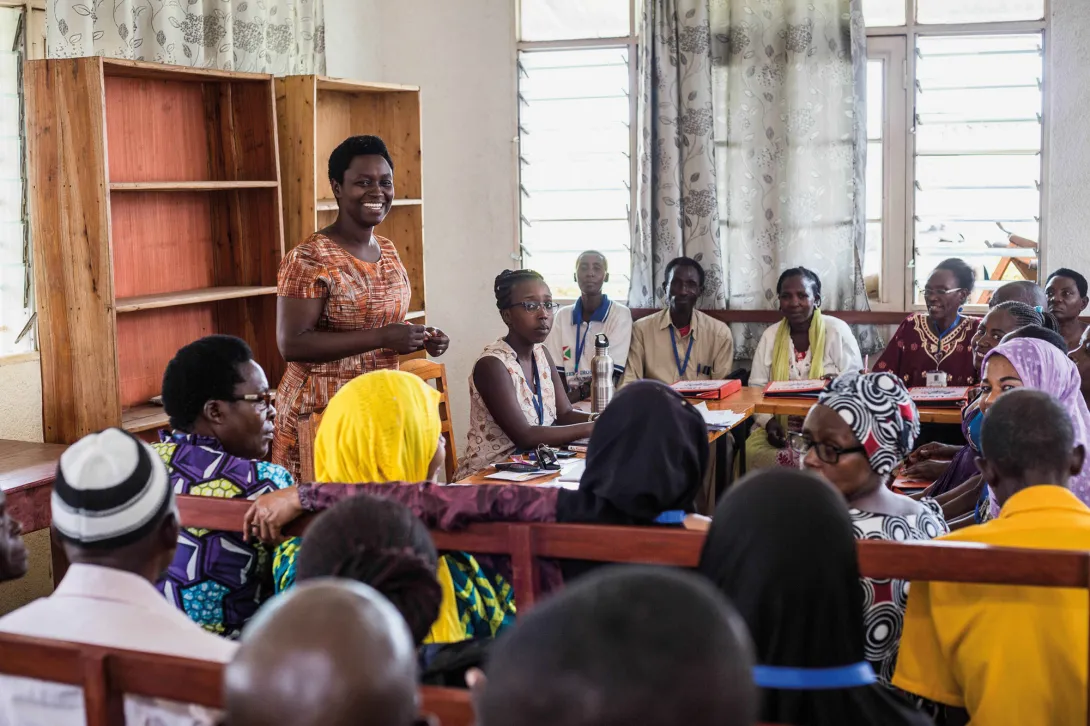
Notre cadre d’intervention
Notre action est alignée sur les orientations politiques de la France et de l’Europe en matière d’égalité de genre, ainsi que sur les dispositifs internationaux de coopération suivants :
- Agenda 2030 adopté en 2015 par l’Assemblée générale des Nations Unies :
- ODD 5 - qui vise à obtenir l’égalité des sexes et à autonomiser toutes les femmes et les filles.
- ODD 10 - qui invite notamment les pays à réduire les inégalités salariales basées sur le sexe (entre autres critères).
- ODD 16 : qui promeut l’avènement de sociétés pacifiques et inclusives aux fins du développement durable.
- Le Plan d’action de l’UE sur l’égalité de genre et l’émancipation des femmes dans l’action extérieure 2021-2025 (GAP III)
- La stratégie française « Droits humains et développement » du ministère de l’Europe et des Affaires étrangères qui prône une approche inclusive face aux inégalités.
- La Stratégie internationale de la France pour une diplomatie féministe (2025-2030).
- La stratégie 100 % lien social du groupe AFD qui vise à soutenir des sociétés plus égalitaires et inclusives. Cette ambition se décline dans toutes les opérations du Groupe autour de deux priorités transversales : la réduction des inégalités et la promotion de l’inclusion, ainsi que l’égalité de genre via une approche féministe transformatrice.
- La Feuille de route pour l’égalité de genre d’Expertise France (2020-2022 - en cours de révision).
Notre offre de services Genre
En tant qu’agence française de coopération technique internationale, nous agissons aux côtés de nos partenaires pour soutenir des politiques et des projets adaptés aux contextes locaux, favorisant l’égalité de genre.
Notre démarche repose sur la co-construction, l’apprentissage horizontal et une diversité de modalités d’appui complémentaires, mobilisables selon les besoins identifiés :
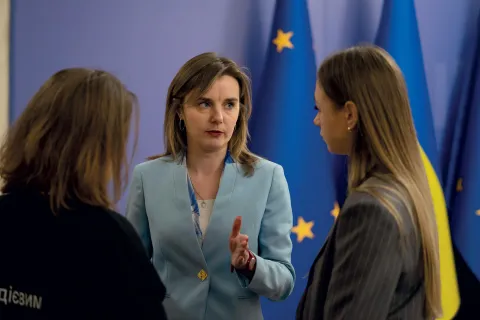 © DR Expertise France
© DR Expertise France
- Le renforcement de capacités et la formation entre pairs
- La création et l’animation de réseaux d’acteurs engagés
- Le partage d’expériences, l’organisation d’ateliers d’idéation et la production de connaissances
- La mobilisation d’expertises publiques et privées
- La sensibilisation, la mise en place de campagnes de communication et d’appui au plaidoyer
- La production d’études, de diagnostics, de plans d’actions, d’actes législatifs
- La gestion de fonds dédiés et l’accompagnement financier
- La production de statistiques de genre, de données sexospécifiques et une budgétisation sensible au genre
Toutes nos interventions adoptent une lecture intersectionnelle, multisectorielle et fondée sur les droits humains des enjeux de genre, à chaque étape de nos projets.
MOOC genre et développement
Ressources à télécharger
FAQ - Pour aller plus loin
Découvrez ci-dessous quelques informations complémentaires sur l'égalité de genre
Issu des travaux de sciences sociales, le genre est un concept sociologique qui renvoie à la répartition des rôles et à la nature des relations entre les femmes et les hommes, résultant d’une construction socioculturelle dans une société donnée à un moment donné dans son histoire. Le genre est ainsi un outil qui permet d’analyser les différences sociales entre les femmes et les hommes et de questionner les « rapports sociaux entre les sexes ».
Le sexe "biologique" quant à lui fait plutôt référence aux caractéristiques physiologiques des hommes et des femmes, qui ont pour fonction la reproduction de l'espèce humaine. En d'autres mots, un individu naît "mâle" ou "femelle” (sexe) et devient un "homme" ou une "femme" (genre).
L’égalité de genre désigne l’égalité de droits, de responsabilités et d’opportunités entre les femmes, les hommes, les filles et les garçons, quelle que soit leur identité de genre. Elle ne signifie pas que les femmes et les hommes deviennent identiques, mais que leurs droits, leurs obligations et leurs chances ne dépendent pas du fait qu’ils soient nés homme ou femme.
C’est un principe fondamental des droits humains et un levier stratégique pour un développement plus juste, durable et inclusif.
Une institution inclusive est une structure publique ou privée qui garantit l’accès équitable aux droits et aux services pour toutes et tous, sans discrimination. Cela implique la mise en œuvre de politiques qui prennent en compte les différences de genre, d’âge, de situation sociale, de handicap ou d’orientation sexuelle, entre autres.
Ces institutions s'engagent à représenter la diversité de la société, à lutter contre les inégalités structurelles et à renforcer la participation de tous les groupes sociaux à la vie publique.
Les inégalités de genre restent un frein majeur au développement durable :
- Plus de 340 millions de femmes et de filles vivront dans l’extrême pauvreté d’ici 2030 si rien ne change (ONU, 2023) et le nombre de femmes vivant dans l’extrême pauvreté est supérieur de 24,3 millions à celui des hommes (ONU Femmes, Rapport 2024 ODD)
- Les femmes de la prochaine génération consacreront environ 2,3 heures par jour de plus que les hommes au travail domestique non rémunéré (ONU, 2023).
- En 2024, 27 % des sièges dans les parlements nationaux étaient occupés par des femmes (ONU Femmes 2024)
- Plus de 230 millions de filles et de femmes vivantes aujourd’hui ont subi des mutilations génitales féminines dans 30 pays d’Afrique, du Moyen-Orient et d’Asie où elles sont pratiquées.
- Les cas de violences sexuelles liées aux conflits ont augmenté de 50 % de 2022 à 2023, les femmes et les filles subissent 95 % de ces crimes (ONU, 2024).
- En 2022, plus de 133 femmes étaient tuées chaque jour par leur partenaire intime ou un membre de leur famille (UNODC et ONU Femmes, 2023). Plus d'un quart de la population mondiale pense qu'il est justifié qu'un homme batte sa femme (PNUD, 2023).
- Les catastrophes climatiques ne sont pas neutres du point de vue du genre. Les femmes et les enfants sont 14 fois plus susceptibles de mourir que les hommes lors de catastrophes naturelles (UNHCR, 2022).
- Près de la moitié de la population mondiale pense que les hommes font de meilleurs dirigeants politiques que les femmes et 43 % pensent que les hommes font de meilleurs chefs d'entreprise que les femmes (PNUD, 2023).
Ces chiffres révèlent la nécessité urgente de renforcer les politiques publiques, les systèmes de santé, d’éducation, de protection sociale et de justice afin de garantir les droits fondamentaux de toutes les femmes et filles du monde.
Un stéréotype de genre est une représentation simplifiée et souvent rigide des rôles, attributs ou comportements que la société assigne aux femmes et aux hommes. Par exemple, considérer que les femmes sont naturellement douces ou que les hommes sont naturellement forts est un stéréotype.
Ces stéréotypes nourrissent les inégalités entre les sexes et limitent l’accès équitable à l’éducation, au travail, à la santé, à la participation politique et à la justice. En France, en Europe et ailleurs, lutter contre les stéréotypes est essentiel pour faire progresser l’égalité de genre, protéger les droits fondamentaux et promouvoir un développement respectueux des femmes et des filles, à travers des politiques publiques inclusives.
Les ODD sont un cadre international adopté par les Nations Unies (ONU) pour éradiquer la pauvreté, protéger la planète et garantir la prospérité pour tous. Trois ODD sont directement liés à l’égalité de genre :
- ODD 5 : Parvenir à l’égalité des sexes et autonomiser toutes les femmes et les filles.
- ODD 10 : Réduire les inégalités entre les pays et en leur sein, notamment les inégalités salariales basées sur le sexe (entre autres critères).
- ODD 16 : Promouvoir l’avènement de sociétés pacifiques et inclusives aux fins du développement durable, assurer l’accès de tous à la justice et mettre en place, à tous les niveaux, des institutions efficaces, responsables et ouvertes à tous.
Ces objectifs rappellent que l’égalité de genre est une condition nécessaire à la paix, à la prospérité et au développement durable.
Plusieurs instruments juridiques et cadres stratégiques (loi, code, convention, stratégie, réglementation…) valables en Europe et à l’international définissent et protègent les droits des femmes, notamment :
- CEDAW (1979) : Convention sur l’élimination de toutes les formes de discrimination à l’égard des femmes
- Conférence du Caire (1994) et la Conférence de Beijing (1995)
- GAP III (2021–2025) : Plan d’action de l’UE sur l’égalité de genre et l’émancipation des femmes dans l’action extérieure.
- La Stratégie internationale de la France pour une diplomatie féministe (2024-2028)
Les violences basées sur le genre (VBG) regroupent tous les actes nuisibles perpétrés contre une personne en raison de son identité de genre. Elles comprennent les violences physiques, psychologiques, sexuelles, socioéconomiques et numériques, et peuvent prendre différentes formes (violence verbale, pratiques de cyberharcèlement, privation de liberté, viol, meurtre).
Ces violences prennent racine dans les inégalités de pouvoir entre les sexes dans les différents contextes sociétaux, freinant la réalisation de l’égalité entre les femmes et les hommes. En France comme ailleurs en Europe, lutter contre les VBG est indispensable pour garantir les droits fondamentaux, sécuriser l’accès au travail, protéger les femmes et les filles et favoriser le développement durable à travers des politiques publiques inclusives et respectueuses de la dignité humaine.
Les droits et santé sexuels et reproductifs (DSSR) sont garantis par plusieurs textes et conventions internationales :
- La Convention sur l’élimination de toutes les formes de discrimination à l’égard des femmes (CEDAW, 1979)
- La Conférence internationale sur la population et le développement (CIPD, 1994)
- La Déclaration universelle des droits de l’Homme
- Les ODD 3 (santé) et 5 (égalité de genre)
- Les engagements issus du Forum Génération Égalité (Paris, 2021)
Ces droits, qui tendent notamment à préserver la santé sexuelle et reproductive des femmes, incluent le droit de prendre des décisions libres, informées et responsables sur la sexualité, la reproduction, le mariage, la contraception, et l’accès aux soins de santé sexuelle.
Le terme “féminisme” est parfois controversé, alors même que le féminisme se définit comme une doctrine qui promeut l’égalité entre les femmes et les hommes dans tous les domaines de la vie : droits, travail, éducation, santé, entre autres. Or, la France et l’Europe portent aujourd’hui une Stratégie internationale pour une diplomatie féministe.
Cette stratégie établit qu’un État ayant adopté une diplomatie féministe place les droits des femmes et des filles et l’égalité de genre au cœur de sa politique étrangère.
La France en fait ainsi une priorité dans chaque domaine de son action européenne et internationale, comme la paix et la sécurité, le climat et l’environnement, le développement, la gouvernance démocratique, les droits de l’homme, l’action humanitaire, les enjeux économiques, financiers et commerciaux, le numérique, la culture, l’éducation, la santé et la sécurité alimentaire.
Toutes les modalités de l’action diplomatique, bilatérale et multilatérale, ainsi que l’activité consulaire, sont concernées, et l’Hexagone a d’ailleurs confirmé la prise en compte de ces enjeux par l’État en inscrivant le droit à recourir à l’interruption volontaire de grossesse (IVG) dans sa constitution en mars 2024.
La France a été le quatrième pays à adopter une diplomatie féministe en 2019, après la Suède, le Canada et le Luxembourg. Aujourd’hui, une quinzaine de pays partagent cet engagement tout en se dotant de leurs propres définitions et priorités.
À travers sa vision d’une diplomatie féministe et ses actions en Europe et dans le monde, la France défend ainsi une vision où l’égalité, la prévention des violences et l’accès aux droits pour toutes les femmes et filles sont des piliers essentiels.
Nos projets
Facilité 1325 – Femmes, paix, sécurité
En cours
2025 - 2028
Bailleurs : Agence française de développement
Nos événements
#RDVExpertise Santé mondiale et genre
Retrouvez le replay de notre dernier #RDVExpertise du 4 décembre 2025 et suivez des débats passionnants sur les enjeux de l’intégration du genre dans les politiques de santé mondiale !
En ligne
#RDVExpertise Violences de genre
Quel est l’état réel des violences sexuelles et sexistes dans le monde aujourd’hui ? Comment les institutions judiciaires, les politiques publiques et les cadres de coopération internationale p...
En ligne
Chiffres-clés 2024
- 208 projets signés CAD 1 et 2 entre 2020 et 2023 pour un montant de 1,08 Mds €
- +46K personnes formées ou sensibilisées par l’agence à l’égalité de genre en 2023
- 550K personnes sensibilisées ou formées dans une approche de réduction des inégalités de genre
- 1191 structures soutenues dans une approche de réduction d’inégalités de genre

